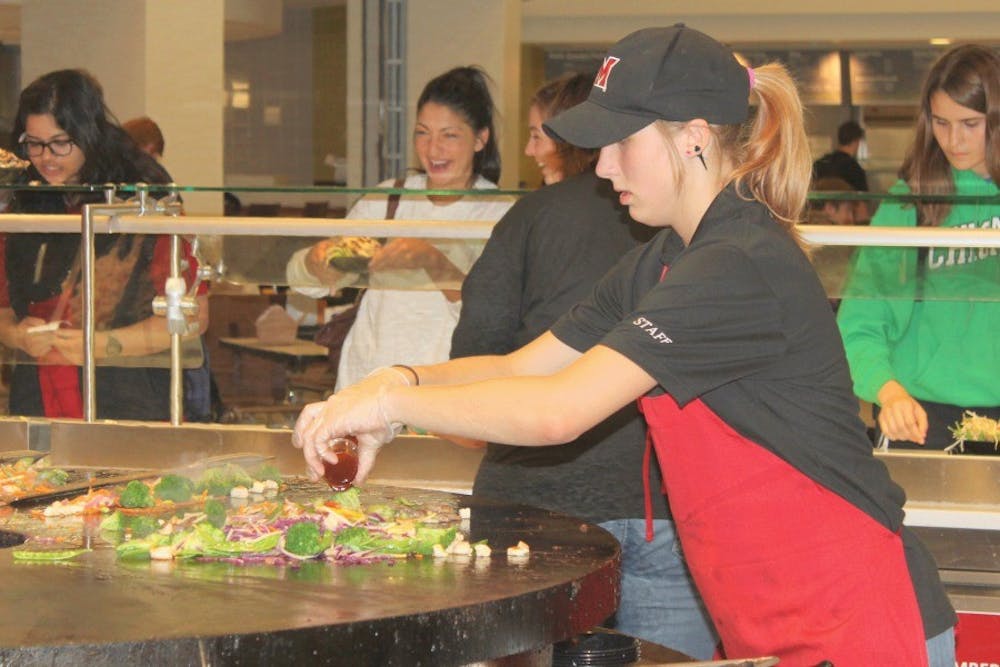A recent report reveals 65% of dining hall work shifts remain empty,
Pictured above, Courtney Dunn, a senior from Talawanda high school.
Photo by Katie Taylor, Editor in Chief
By Kelly Higginson, Senior Staff Writer
A report by Dining and Culinary Services revealed student employment for fall 2014 is short 3,500 hours in comparison to last year.
In preparing for the fall semester, Culinary Services did not expect the drastic drop in the number of student employees.
Every spring, staff development specialist Jennifer Baker Williams evaluates the number of student employees at each dining hall location through statistics.
"Our customer count has gone up, which we expected, but the people willing to work is going down," Baker Williams said.
According to Nancy Heidtman, Senior Director of Dining and Culinary Services, the lack of student staffing has resulted in the long lines students complain about at the Armstrong Student Center.
With full-scale operations in all of the dining halls, the Vacancy Report, released earlier this semester, showed that only 25 to 35 percent of student shifts are currently filled, This means nearly 65 percent of work shifts in dining halls are vacant.
Mark Andrea, the manager of computer systems for dining services, is overwhelmed with the lack of student employment this fall.
"We've certainly done everything that we have in years past," Andrea said. "We've put it out there digitally, we had sign ups at the job fair, information on our websites, things sent out to parents, there are just not enough workers."
Enjoy what you're reading?
Signup for our newsletter
To recruit more student workers, Heidtman has ensured that there will be more bonus programs for students who decide to work in dining services.
In years past, Culinary Services restricted student employment to Miami students only, giving the college students priority. However, as of this fall, they are now taking applications from Talawanda High School students in hopes that some students might apply and fill the vacant positions.
"We have been trying all of the positive methods to recruit students, we will honestly take anyone that is willing to work," Baker Williams said.
Student employees who work for dining services have the flexibility of choosing their own hours, as long as they do not exceed 22 hours per week.
"Some students are working every maximum minute, and some are working at the hours that they can, and we can't ask them to do more," Baker Williams said.
In moving past the understaffing, Culinary Services has started distinguishing zones to group multiple dining locations together in similar areas. Some places are busier than others at certain times, and employees are starting to work multiple halls under the same shift.
"Wherever needs help, the executive of that zone can send workers over to that area for some extra help," Baker Williams said.
Associated Student Government (ASG) helped Culinary Services last spring by launching employee incentive programs that were set to start the first four weeks this fall, a time which usually sees the lowest student staffing.
"We ran all three of the incentive programs and none of them met our expectations," Andrea said.
Andrea said that, for the time being, Culinary Services is bringing in outside help, such as temp agencies, and hiring more full time staff that they can rely on each day.
"We are doing the best that we can, and working with what we have," Andrea said.
The Streats Food Truck will also be driving around Armstrong and Maple Street area serving food to help alleviate the lines inside the busy dining locations.




